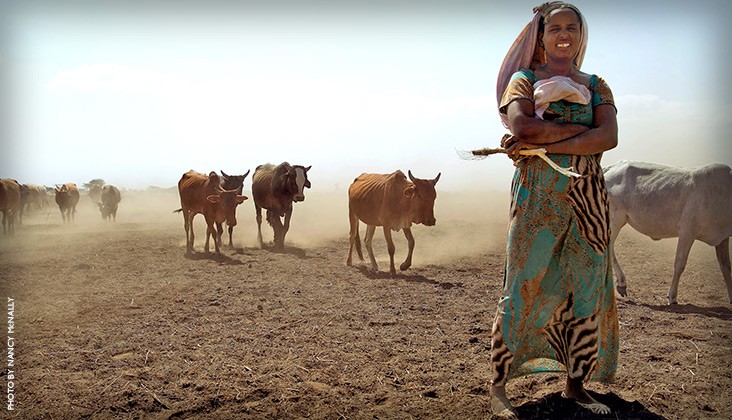Speeches Shim

Ethiopia is a classic example of how severe degradation of ecosystems and productive agricultural lands, and poor utilization of water resources increase poverty, food insecurity, loss of biodiversity, and even conflict. By incorporating environmental issues into our work within Ethiopia, USAID strives to develop initiatives that make improvements in multiple sectors and promote sustainable development. Through ongoing activities supporting disaster readiness and community resilience, we are assisting Ethiopia improve its capacity to predict and respond to disasters—principally drought--which affect many parts of the country.
Through our support to the Productive Safety Net Program, public work interventions are undertaken at the community level to promote soil and water conservation, and protect critical watersheds. Not only does watershed protection and rehabilitation reduce erosion and siltation for healthier rivers; it also provides economic and health benefits for the many people who depend on the water source. We also work with the Government of Ethiopia and local partners to leverage innovative technology to forecast weather patterns to predict and plan ways to address potential drought or other climate effects, and ensure food security and strengthen resilience.
Furthermore, USAID interventions in pastoral areas increase the grazing value of land through efforts to control or eradicate invasive species such as Prosopis juliflora and Acacia drepanolobium, and improve pasture by maintaining enclosures. Bringing more land under improved management can help to reduce the total area needed to maintain cattle populations, as land is allowed to recover and remain productive, or to be cleared for agricultural expansion.
KEY ACTIVITIES
-
The Feed the Future Ethiopia Livelihoods for Resilience project supports communities in rehabilitating and improving management of watersheds and other natural resources to enhance irrigation and year-round access to water sources. This helps these communities weather the effects of recurring droughts and maximize their land use for harvesting crops.
-
USAID’s Feed the Future Ethiopia Land Governance Activity builds on USAID's substantial past investments to improve land governance and land administration, and strengthens land tenure rights in Ethiopia to promote economic growth, increase agricultural productivity, and reduce conflict and resource degradation.
-
The Feed the Future Ethiopia Resilience in Pastoral Areas project aims to increase climate resilient growth in the lowlands of Ethiopia by promoting livelihood diversification, enhancing local use of national meteorological information, and piloting weather-based livestock insurance products.
- Through the Famine Early Warning Systems Network (FEWS NET) (link is external) activity, we are helping to predict and plan ways to decrease the use of natural resources during times of economic and food distress, when people tend to increasingly depend on these resources for survival.


Comment
Make a general inquiry or suggest an improvement.